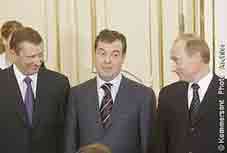Nobody understands us, say Russians
By David Matsaberidze
Thursday, September 4

Russia blames the EU for ‘imperfect understanding’ of the Russian motivation for its military involvement in Georgia, and calls President Saakashvili a political corpse. The US declares that it waits for the withdrawal of the Russian military forces as “time still remains till the deadline.”
“Saakashvili no longer exists as a President”, the President of the Russian Federation Dmitry Medvedev has stated, adding that the world is changing and the acknowledgment of the independence of two breakaway regions of Georgia should be seen in this context. “The right viewpoint won in Europe, by not imposing sanctions on the Russian Federation,” Medvedev stressed. He likewise expressed readiness to discuss “various issues, including post-conflict resolution in the region” with the international community and blamed US policy towards Georgia for leading Saakashvili to use violence. “The US created in the Georgian leader the sense that he could act with impunity”, Medvedev stressed, adding that the US should understand that “its virtual project under the name “Free Georgia” has failed.”
Russian Prime Minister, Vladimir Putin, said that he was surprised that humanitarian aid was delivered to the “aggressors” and not to the real victims of the conflict. “If we are talking about humanitarian aid, it should be provided to the victim of the aggression, which is South Ossetia,” Putin stressed in the Uzbek capital, Tashkent, on September 2. “We do not understand what the U.S. ships are doing on the Georgian shore; but it’s a matter of taste and that’s our American colleagues’ decision,” he added. But while stressing that Russia’s reaction to the presence of NATO vessels in the Black Sea would be “calm, without any hysteria,” Putin brushed off western calls for the withdrawal of Russian troops from Georgia, concluding: “We have no armed forces in Georgia at all, there are only peacekeepers, 500 of them ... and their only job is to maintain security.”
The Deputy Chief of the General Staff of the Russian Armed Forces, Anatoli Nogovitsyn, confirmed that regular troops had left not only Georgia proper but also Abkhazia and South Ossetia. According to him “only Russian peacekeepers remain in Georgia in order to provide security for the population and to monitor the implementation of the existing agreement”. Georgia’s National Security Council Secretary, Alexandre Lomaia, in response to these remarks, stressed that “the Russian President has lost control, because his efforts to depose the Georgian government have failed. The Georgian President is a democratically elected leader, he and his government enjoy the support of the Georgian people and the international community.”
The Press Spokesperson of the White House, Dana Perino, welcomed the EU’s decision of Monday, particularly stressing the importance of “the acknowledgment of the territorial integrity, sovereignty and independence of Georgia.” She said that the US is deeply concerned about the stability and security of the region. Sean McCormack, a representative of the US Secretary of State, stressed that Russia is aware of its duties and responsibilities. McCormack termed the EU decision a “strong resolution” and confirmed the unity of the EU and US regarding Georgian affairs. The fact that the statement set forth both an independent and a joint action plan which formulated necessary measures against the Russian Federation was declared to be a positive result of the EU Summit.
The OSCE condemns Russian actions and recognizes Georgia’s territorial integrity, the Chairman of the Georgian Parliamentary Committee of Foreign Affairs, Lasha Zhvania, stated after a meeting with Goran Lennmarker, the Special Representative of the President of OSCE Parliamentary Assembly. Zhvania says that the situation in Georgia isn’t only Georgia’s problem as there are “serious messages regarding the issues of Karabakh and Transdnestria after the recognition of independence of Abkhazia and South Ossetia.” This statement has a serious basis - the leader of the Nagorno Kharabakh separatists, Bako Saakian, stressed at the recent 17th anniversary celebration of the ‘independence’ of Nagorno Kharabakh that “the ongoing processes make us hope that the day of independence of the Nagorno Karabakh is not too far away.”
The Financial Times has highlighted the aggressive actions of the Russian soldiers in Georgia but quotes high ranking Russian army officials as condemning the action. Russian generals are not satisfied with the “unfinished” operation, in which Tbilisi was left alone. As Duma member and influential political analyst Sergei Markov stated, “The Kremlin lost control over the army in Georgia”, while former General Leonid Ivashov, Head of the Moscow Academy for Geopolitical Affairs, stressed that “the aggression had to be taken to the end – capitulation, resulting in the full disarmament of the Georgian military forces.”
